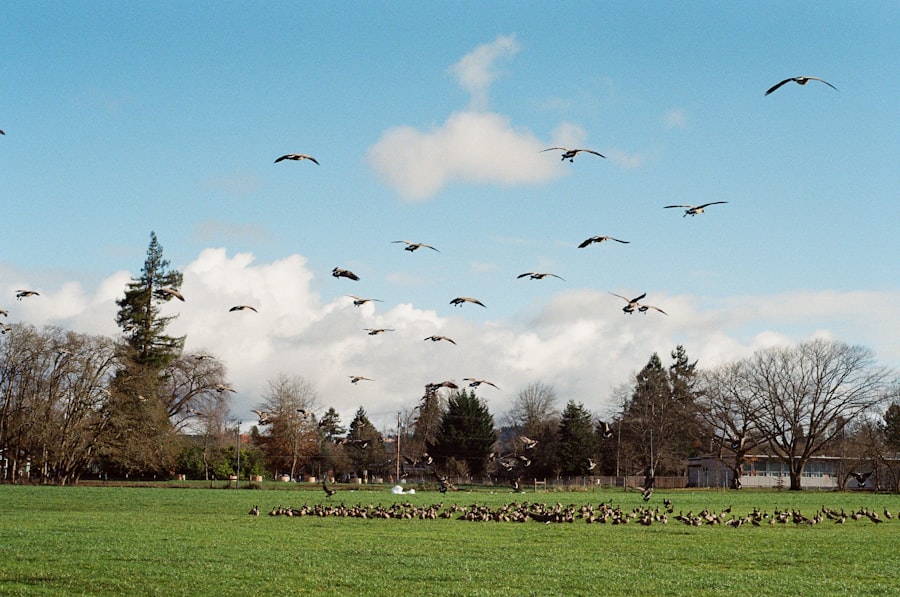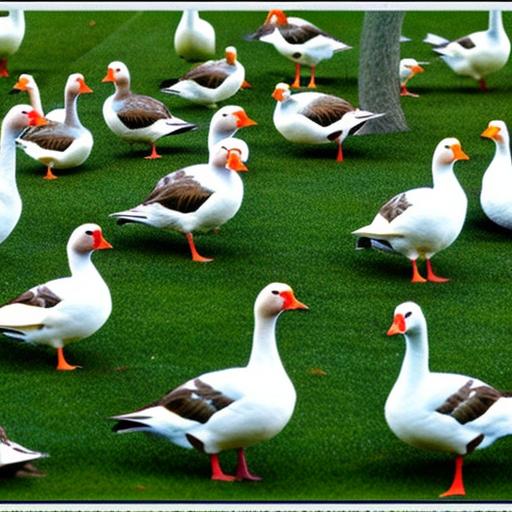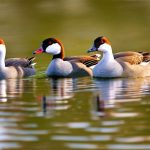Geese are fascinating creatures with complex social structures and behaviors. Understanding their behavior is crucial in effectively deterring them from your property. Geese are highly social animals and often travel in large flocks, especially during migration. They are also known for their strong family bonds and will fiercely protect their young. Geese are herbivores and are attracted to areas with lush, green vegetation, making lawns and parks ideal feeding grounds for them. They are also drawn to bodies of water, such as ponds or lakes, where they can find food and rest. Geese are also known for their territorial nature and will aggressively defend their nesting sites. Understanding these behaviors can help in implementing effective strategies to keep geese away from your property.
Geese are also known for their adaptability and intelligence. They can quickly learn to overcome obstacles and find ways to access areas that are off-limits to them. Geese have excellent memory and can remember locations where they have found food or shelter in the past. They are also highly vocal animals and use honking as a means of communication within their flock. By understanding these behaviors, property owners can develop comprehensive plans to deter geese from their premises effectively.
Key Takeaways
- Geese are social birds that prefer open areas near water and can become aggressive during nesting season.
- Barriers such as fences, hedges, and shrubs can be effective in deterring geese from entering a property.
- Repellents like taste aversions, sound machines, and visual deterrents can discourage geese from staying on a lawn.
- Regularly removing food sources, keeping grass short, and cleaning up droppings can make a lawn less attractive to geese.
- Scare tactics such as decoys, motion-activated devices, and trained dogs can startle geese and encourage them to leave an area.
- If geese become a persistent problem, it may be necessary to seek professional help from wildlife management experts.
- It is important to respect wildlife and consider legal regulations when implementing strategies to manage geese on a property.
Creating barriers to deter geese
Creating physical barriers is an effective way to deter geese from accessing your property. Fencing is one of the most common barriers used to keep geese away. Installing a fence around the perimeter of your property or specific areas such as ponds or gardens can prevent geese from entering. It is essential to ensure that the fence is at least three feet high and made of materials that are difficult for geese to perch on or see through. Another effective barrier is the use of netting to cover bodies of water, such as ponds or lakes, to prevent geese from accessing them. Netting should be securely fastened and regularly maintained to ensure its effectiveness.
Another method of creating barriers is the use of landscaping features such as hedges or shrubs. Planting dense vegetation around the perimeter of your property can create a natural barrier that deters geese from entering. Geese prefer open spaces where they can easily spot potential predators, so dense vegetation can make them feel vulnerable and less likely to linger in the area. Additionally, installing motion-activated sprinkler systems can startle geese and discourage them from staying on your property. These systems can be strategically placed in areas where geese are known to gather, such as lawns or gardens, to effectively deter them.
Using repellents to keep geese away
Repellents are another effective method for keeping geese away from your property. There are various types of repellents available, including visual, auditory, and olfactory repellents. Visual repellents, such as decoy predators or reflective tape, can create the illusion of danger and deter geese from entering an area. Decoy predators, such as fake coyotes or dogs, can be strategically placed in areas where geese are known to gather to create a sense of threat. Reflective tape can be hung in trees or around the perimeter of a property to create a visual deterrent for geese.
Auditory repellents, such as sonic devices or noise-making devices, can also be effective in deterring geese. These devices emit sounds that are unpleasant to geese and can discourage them from staying in an area. Olfactory repellents, such as chemical sprays or granules, release scents that are unpleasant to geese and can make an area less attractive to them. These repellents can be applied to specific areas of a property, such as lawns or gardens, to discourage geese from feeding or nesting there.
It is essential to regularly rotate and maintain repellents to prevent geese from becoming accustomed to them. By using a combination of visual, auditory, and olfactory repellents, property owners can effectively deter geese from their premises.
Maintaining a clean and tidy lawn
Maintaining a clean and tidy lawn is essential in deterring geese from your property. Geese are attracted to areas with lush, green vegetation where they can find food and rest. By keeping your lawn well-maintained, you can make it less attractive to geese. Regularly mowing the grass and removing weeds can make the area less appealing to geese as it reduces the availability of food sources for them.
Another important aspect of maintaining a clean lawn is the removal of standing water. Geese are drawn to bodies of water where they can find food and rest. By eliminating standing water on your property, such as puddles or stagnant ponds, you can make it less attractive to geese. Additionally, cleaning up any spilled birdseed or pet food can also help in deterring geese from your property.
It is also essential to regularly clean up goose droppings from your lawn and other areas of your property. Geese produce a significant amount of droppings, which not only create a mess but also attract more geese to the area as they are drawn to places where they have previously fed. By regularly cleaning up droppings, you can make your property less appealing to geese and discourage them from returning.
Implementing scare tactics
Implementing scare tactics is an effective method for deterring geese from your property. Scare tactics aim to create a sense of danger or threat that encourages geese to leave an area. One common scare tactic is the use of visual deterrents such as decoy predators or reflective objects. Decoy predators, such as fake coyotes or dogs, can be strategically placed in areas where geese are known to gather to create a sense of danger. Reflective objects, such as balloons or tape, can also be used to startle geese and discourage them from staying in an area.
Another scare tactic is the use of auditory deterrents such as sonic devices or noise-making devices. These devices emit sounds that are unpleasant to geese and can encourage them to leave an area. Additionally, using motion-activated devices such as sprinklers or lights can startle geese and make them feel uncomfortable in an area.
It is essential to regularly rotate scare tactics to prevent geese from becoming accustomed to them. By using a combination of visual, auditory, and motion-activated scare tactics, property owners can effectively deter geese from their premises.
Seeking professional help

In some cases, deterring geese from your property may require professional assistance. Wildlife management companies specialize in developing comprehensive plans for deterring geese and other wildlife from properties. These companies have the expertise and resources to assess the specific needs of a property and implement effective strategies for keeping geese away.
Professional wildlife management companies may use a combination of methods such as habitat modification, exclusion techniques, and repellents to deter geese from properties effectively. They can also provide ongoing maintenance and monitoring to ensure that the strategies remain effective over time.
It is essential to research and select a reputable wildlife management company with experience in deterring geese from properties. By seeking professional help, property owners can ensure that they receive expert guidance and support in effectively managing geese on their premises.
Respecting wildlife and legal considerations
When implementing strategies to deter geese from your property, it is essential to respect wildlife and consider legal considerations. Geese are protected under various wildlife conservation laws, so it is crucial to ensure that any methods used to deter them comply with these regulations.
Property owners should research local wildlife regulations and consult with wildlife management professionals to ensure that they are using legal and humane methods for deterring geese from their premises. It is also important to consider the potential impact of deterrent methods on other wildlife species and the environment.
Respecting wildlife means finding a balance between protecting your property and coexisting with wildlife in a responsible manner. By considering legal considerations and respecting wildlife, property owners can effectively manage geese on their premises while maintaining ethical and sustainable practices.
In conclusion, understanding geese behavior is crucial in developing effective strategies for deterring them from properties. Creating barriers, using repellents, maintaining a clean lawn, implementing scare tactics, seeking professional help, and respecting wildlife and legal considerations are all important aspects of managing geese effectively. By implementing comprehensive plans that take into account the behavior of geese and the specific needs of a property, property owners can successfully deter geese while maintaining ethical and sustainable practices.
Looking to keep geese off your lawn? Check out this insightful article on PoultryWizard that provides valuable tips and strategies for managing geese in your outdoor space. Whether you’re dealing with a small flock or a larger group of geese, this article offers practical advice to help you maintain a beautiful lawn while coexisting with these feathered visitors.
FAQs
What are some effective methods for keeping geese off your lawn?
Some effective methods for keeping geese off your lawn include using visual deterrents such as scarecrows or reflective objects, using physical barriers like fences or netting, and using repellents such as goose repellent sprays or granules.
Are there any natural ways to keep geese off your lawn?
Yes, there are natural ways to keep geese off your lawn. Planting tall grasses or shrubs around the perimeter of your lawn can create a natural barrier that deters geese from entering. Additionally, using natural repellents such as predator urine or citrus-based sprays can also help keep geese away.
Is it legal to harm or kill geese to keep them off your lawn?
In many places, it is illegal to harm or kill geese as they are protected under wildlife conservation laws. It is important to use humane and non-lethal methods to keep geese off your lawn.
How can I prevent geese from nesting on my lawn?
To prevent geese from nesting on your lawn, you can use visual deterrents such as decoy predators or floating alligator decoys to make the area seem less safe for nesting. Additionally, regularly mowing your lawn and removing any tall grass or shrubs can discourage geese from nesting.
Are there any long-term solutions for keeping geese off my lawn?
Long-term solutions for keeping geese off your lawn include modifying the landscape to make it less attractive to geese, such as adding hedges or other natural barriers, and consistently using deterrents and repellents to discourage geese from frequenting your lawn. Working with local wildlife management authorities can also provide long-term solutions for managing geese populations in your area.
Meet Walter, the feathered-friend fanatic of Florida! Nestled in the sunshine state, Walter struts through life with his feathered companions, clucking his way to happiness. With a coop that’s fancier than a five-star hotel, he’s the Don Juan of the chicken world. When he’s not teaching his hens to do the cha-cha, you’ll find him in a heated debate with his prized rooster, Sir Clucks-a-Lot. Walter’s poultry passion is no yolk; he’s the sunny-side-up guy you never knew you needed in your flock of friends!







